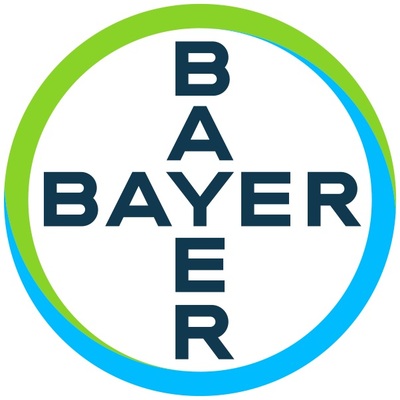Bayer has exercised its option, under a change-in-control clause in the collaboration agreement with Loxo Oncology, to obtain the exclusive licensing rights for the global development and commercialization, for Vitrakvi® (larotrectinib) and BAY 2731954 (LOXO-195).
|
WHIPPANY, N.J., /PRNewswire/ -- Bayer has exercised its option, under a change-in-control clause in the collaboration agreement with Loxo Oncology to obtain the exclusive licensing rights for the global development and commercialization, for Vitrakvi® (larotrectinib) and BAY 2731954 (LOXO-195). Both compounds are being developed globally for the treatment of adult and pediatric patients with advanced solid tumors harboring NTRK gene fusions. The option was triggered by the acquisition of Loxo Oncology by Eli Lilly and Company, which became effective today. As a result of this exercise, the joint co-promotion agreement in the U.S. between Bayer and Loxo Oncology is being converted to full commercialization in the U.S. by Bayer.
"Bayer is dedicated to improving the lives of cancer patients, and precision oncology is a promising area that has the potential to redefine the way cancer patients are treated. Our collaboration with Loxo Oncology was an important milestone and with the opportunity to exercise our option on Vitrakvi® and BAY 2731954, we are taking the next step in our efforts to advance the future of cancer care and strengthen our leadership in this field," said Robert LaCaze, Member of the Executive Committee of Bayer's Pharmaceuticals Division and Head of the Oncology Strategic Business Unit at Bayer. "With the first-ever approved TRK inhibitor with activity against TRKA, TRKB and TRKC, Vitrakvi®, and BAY 2731954 progressing through clinical development, we have two compounds in our precision oncology portfolio and we are committed to expanding this portfolio by bringing forward highly differentiated and promising additional projects." In November 2017, Bayer and Loxo Oncology entered into a global collaboration for the joint development and commercialization of the TRK inhibitors Vitrakvi® and BAY 2731954 (LOXO-195). Following the change of control, Bayer will be solely responsible for the global development and commercialization of both Vitrakvi® and BAY 2731954. Bayer is already leading ex-U.S. regulatory activities, and worldwide commercial activities. When the new exclusive licensing arrangement takes effect, the co-promotion in the U.S. will be converted into an exclusive commercialization by Bayer and the sharing of commercial costs and profits on a 50/50 basis for the U.S. market will be replaced by royalties to be paid by Bayer. Bayer will continue to pay royalties on future net sales outside the U.S. In addition, in connection with Bayer's exercise of the option, certain licenses granted by Loxo Oncology to Bayer will become exclusive following anti-trust clearance in the U.S. About Vitrakvi® (larotrectinib) and BAY 2731954 BAY 2731954 is an oral investigational new drug in clinical development rationally designed for the treatment of patients with cancers that have acquired resistance to initial TRK therapy. In July 2017, a multi-center Phase I/II trial in patients with TRK fusion cancers who have progressed while receiving another TRK inhibitor or are intolerant to another TRK inhibitor was initiated. About TRK Fusion Cancer Important Safety Information Neurotoxicity: Among the 176 patients who received VITRAKVI, neurologic adverse reactions of any grade occurred in 53% of patients, including Grade 3 and Grade 4 neurologic adverse reactions in 6% and 0.6% of patients, respectively. The majority (65%) of neurological adverse reactions occurred within the first three months of treatment (range 1 day to 2.2 years). Grade 3 neurologic adverse reactions included delirium (2%), dysarthria (1%), dizziness (1%), gait disturbance (1%), and paresthesia (1%). Grade 4 encephalopathy (0.6%) occurred in a single patient. Neurologic adverse reactions leading to dose modification included dizziness (3%), gait disturbance (1%), delirium (1%), memory impairment (1%), and tremor (1%). Advise patients and caretakers of these risks with VITRAKVI. Advise patients not to drive or operate hazardous machinery if they are experiencing neurologic adverse reactions. Withhold or permanently discontinue VITRAKVI based on the severity. If withheld, modify the VITRAKVI dose when resumed. Hepatotoxicity: Among the 176 patients who received VITRAKVI, increased transaminases of any grade occurred in 45%, including Grade 3 increased AST or ALT in 6% of patients. One patient (0.6%) experienced Grade 4 increased ALT. The median time to onset of increased AST was 2 months (range: 1 month to 2.6 years). The median time to onset of increased ALT was 2 months (range: 1 month to 1.1 years). Increased AST and ALT leading to dose modifications occurred in 4% and 6% of patients, respectively. Increased AST or ALT led to permanent discontinuation in 2% of patients. Monitor liver tests, including ALT and AST, every 2 weeks during the first month of treatment, then monthly thereafter, and as clinically indicated. Withhold or permanently discontinue VITRAKVI based on the severity. If withheld, modify the VITRAKVI dosage when resumed. Embryo-Fetal Toxicity: VITRAKVI can cause fetal harm when administered to a pregnant woman. Larotrectinib resulted in malformations in rats and rabbits at maternal exposures that were approximately 11- and 0.7-times, respectively, those observed at the clinical dose of 100 mg twice daily Advise women of the potential risk to a fetus. Advise females of reproductive potential to use an effective method of contraception during treatment and for 1 week after the final dose of VITRAKVI. Most Common Adverse Reactions (≥20%): The most common adverse reactions (≥20%) were: Drug Interactions: Avoid coadministration of VITRAKVI with strong CYP3A4 inhibitors (including grapefruit or grapefruit juice), strong CYP3A4 inducers (including St. John's wort), or sensitive CYP3A4 substrates. If coadministration of strong CYP3A4 inhibitors or inducers cannot be avoided, modify the VITRAKVI dose as recommended. If coadministration of sensitive CYP3A4 substrates cannot be avoided, monitor patients for increased adverse reactions of these drugs. Lactation: Advise women not to breastfeed during treatment with VITRAKVI and for 1 week after the final dose. Please see the full Prescribing Information. About Oncology at Bayer About Bayer © 2019 Bayer, Inc. All rights reserved. Media Contact: Forward-Looking Statements Intended for U.S. Media
SOURCE Bayer |





